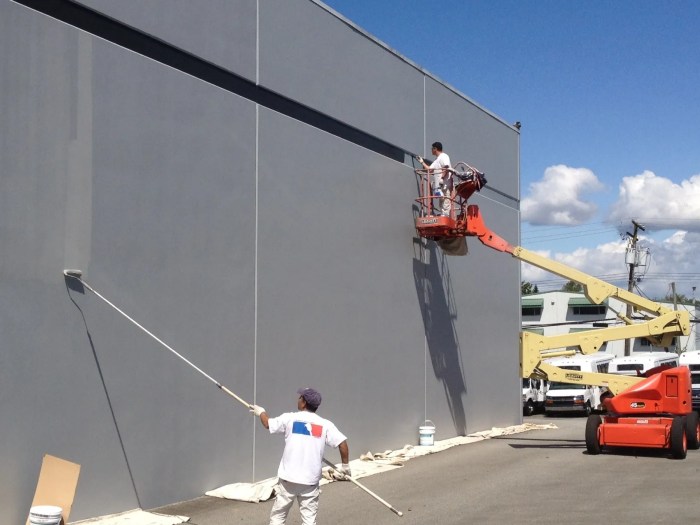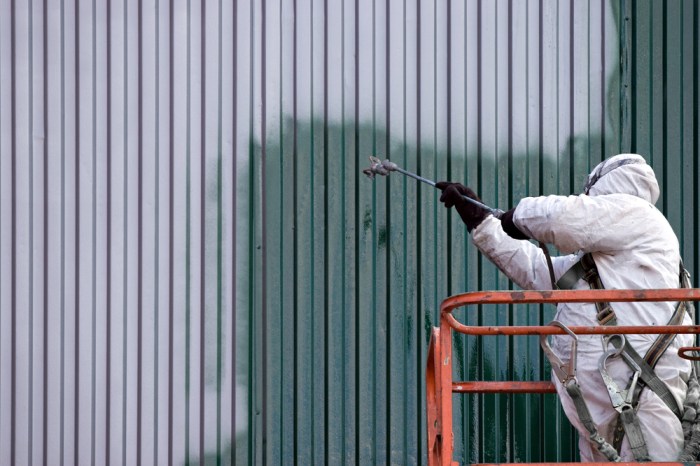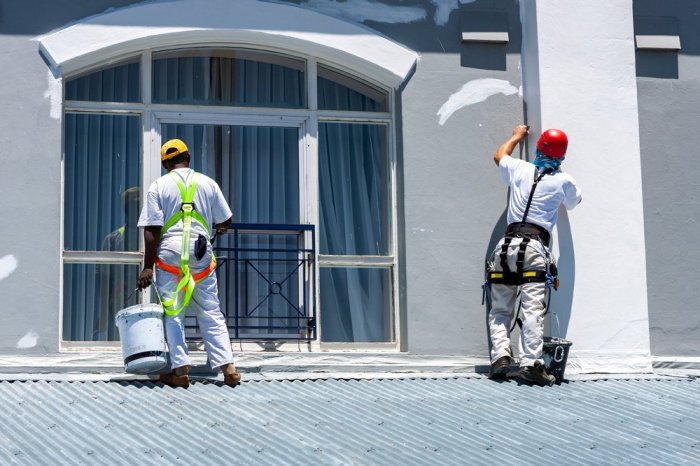Exploring the World of Commercial Painting Contractors

Commercial painting contractors play a vital role in the construction industry, transforming spaces with their expertise and creativity. From large-scale projects to intricate details, these professionals bring life to buildings and structures through the art of paint. Let's delve into the realm of commercial painting contractors to uncover the secrets behind their craft.
Overview of Commercial Painting Contractors
Commercial painting contractors play a crucial role in the construction industry by providing professional painting services for businesses and commercial properties.
Types of Projects
- Interior and exterior painting of office buildings
- Painting of retail spaces and shopping centers
- Painting of hotels, restaurants, and other hospitality establishments
- Painting of industrial facilities and warehouses
Importance of Hiring Professionals
It is essential for businesses to hire professional commercial painting contractors due to the following reasons:
- Expertise in handling large-scale painting projects efficiently
- Use of high-quality materials and equipment for long-lasting results
- Adherence to safety regulations and standards to protect employees and customers
- Ability to work within specific timelines to minimize disruptions to business operations
Services Offered
Commercial painting contractors typically offer a wide range of services tailored to the specific needs of businesses and commercial properties. These services go beyond what residential painting contractors provide, as they are equipped to handle larger-scale projects and unique requirements.
Interior and Exterior Painting
Commercial painting contractors are experienced in painting both interior and exterior surfaces of commercial buildings. This includes walls, ceilings, trim, doors, and more. They have the expertise to work with a variety of materials and surfaces, ensuring a professional and long-lasting finish.
Specialized Coatings
In addition to standard painting services, commercial painting contractors may offer specialized coatings for specific needs. This can include anti-graffiti coatings, epoxy flooring coatings, fire-retardant coatings, and more. These coatings provide added protection and durability to surfaces in commercial settings.
Decorative Finishes
Commercial painting contractors may also provide decorative finishes for businesses looking to add a unique touch to their space. This can include faux finishes, textured painting, murals, and other decorative techniques that can enhance the aesthetic appeal of a commercial property.
Comparison to Residential Painting Contractors
While residential painting contractors focus on smaller-scale projects in individual homes, commercial painting contractors are equipped to handle larger and more complex projects in commercial settings. They have the expertise to work with a variety of surfaces, materials, and coatings specific to commercial properties.
Additionally, commercial painting contractors are experienced in working efficiently to minimize disruptions to business operations during the painting process.
Qualifications and Training

Commercial painting contractors must possess a specific set of qualifications and certifications to ensure they are equipped to handle the demands of the job.
Typical Qualifications and Certifications
- A valid contractor's license is typically required to work as a commercial painting contractor.
- Completion of a formal apprenticeship program or vocational training in painting is often necessary.
- Certifications from organizations such as the Painting and Decorating Contractors of America (PDCA) can demonstrate expertise and credibility.
Importance of Training and Experience
Training and experience play a crucial role in the commercial painting industry as they ensure contractors have the necessary skills and knowledge to deliver high-quality results.
- Training helps contractors understand safety protocols, proper techniques, and industry best practices.
- Experience allows contractors to handle various challenges effectively and efficiently, leading to client satisfaction.
Regulations and Standards
Commercial painting contractors must adhere to specific regulations and standards to ensure the safety of their work and compliance with industry requirements.
- Following Occupational Safety and Health Administration (OSHA) guidelines is essential to maintain a safe working environment.
- Adhering to environmental regulations regarding paint disposal and use of eco-friendly products is becoming increasingly important in the industry.
Equipment and Tools
When it comes to commercial painting contractors, having the right equipment and tools is essential for delivering high-quality results and ensuring efficiency in their work. The choice of equipment can greatly impact the overall outcome of a painting project, from the finish quality to the time it takes to complete the job.
Let's take a closer look at the essential equipment and tools used by commercial painting contractors and how advancements in painting technology have influenced their selection.
Essential Equipment and Tools
- Paint Sprayers: Used for applying paint quickly and evenly on large surfaces.
- Rollers and Brushes: Essential for detailed work and areas where sprayers cannot reach.
- Sanding Tools: Used to prepare surfaces by smoothing out imperfections before painting.
- Drywall Repair Tools: Necessary for fixing any damages on walls before painting.
- Ladders and Scaffolding: Needed to access high places and ensure safety during painting.
Impact of Equipment on Quality of Work
The choice of equipment can significantly impact the quality of work done by commercial painting contractors. Using high-quality paint sprayers, rollers, and brushes can result in a smooth and even finish, while the right sanding tools can ensure that surfaces are properly prepared for painting.
Investing in the best tools can lead to better results and customer satisfaction.
Advancements in Painting Technology
Advancements in painting technology have revolutionized the tools used by commercial painting contractors. From innovative paint sprayers with adjustable settings to digital color matching tools, painters now have access to equipment that can help them work more efficiently and produce better results.
These advancements have not only improved the quality of work but also reduced the time it takes to complete painting projects.
Safety Practices
Commercial painting contractors prioritize safety in their work to ensure a secure environment for their employees and clients alike. By following specific safety measures and undergoing proper training, they can minimize risks and prevent accidents on the job.
Common Safety Practices
- Wearing appropriate personal protective equipment (PPE) such as gloves, goggles, and masks.
- Ensuring proper ventilation in enclosed spaces to prevent exposure to harmful fumes.
- Securing ladders and scaffolding properly to prevent falls.
Examples of Safety Measures
- Conducting regular safety inspections of equipment and work areas.
- Implementing a buddy system for working at heights to ensure mutual support and assistance.
- Providing safety training to all employees on handling hazardous materials and emergency procedures.
Importance of Safety Training
Safety training is crucial for commercial painting contractors to ensure that all employees are aware of potential hazards and know how to mitigate risks effectively. By investing in safety training programs, contractors can enhance workplace safety, reduce accidents, and maintain a positive reputation within the industry.
Cost Factors

When it comes to hiring commercial painting contractors, there are several factors that can influence the overall cost of the project. Understanding these factors can help businesses budget effectively and choose the right contractor for their needs.
Factors Influencing Cost
- The size of the project: Larger projects will generally cost more due to the increased amount of labor and materials required.
- The complexity of the job: Projects that require special techniques or multiple coats of paint will also tend to cost more.
- The type of paint used: Higher quality paints may come at a higher cost, but can also offer better durability and longevity.
- Preparation work needed: Projects that require extensive preparation, such as sanding, priming, or repairs, will incur additional costs.
Comparing Pricing Models
- Flat-rate pricing: Some contractors may offer a flat rate for the entire project, which can help businesses budget more accurately.
- Hourly rates: Other contractors may charge by the hour, which can be beneficial for smaller projects or those with uncertain timelines.
- Cost plus pricing: This model involves charging for the cost of materials plus a percentage for labor and overhead, providing transparency but potentially leading to higher costs.
Budgeting for Commercial Painting Projects
- Get multiple quotes: It's important to get estimates from several different contractors to compare pricing and ensure you are getting a fair deal.
- Allocate a contingency fund: It's a good idea to set aside a buffer in your budget for any unexpected expenses that may arise during the project.
- Communicate openly: Be clear with your contractor about your budget constraints and priorities to ensure they can work within your financial parameters.
Final Review

As we conclude our journey through the world of commercial painting contractors, it becomes evident that their impact goes far beyond aesthetics. Their precision, skill, and dedication shape the environments we interact with daily, leaving a lasting impression on all who encounter their work.
Answers to Common Questions
What types of projects do commercial painting contractors typically work on?
Commercial painting contractors usually work on a wide range of projects, including office buildings, retail stores, warehouses, and industrial facilities.
What qualifications are required for commercial painting contractors?
Typical qualifications include certification in painting techniques, knowledge of safety protocols, and experience in handling commercial projects.
How do commercial painting contractors ensure safety on job sites?
Commercial painting contractors follow strict safety practices, such as using protective gear, implementing fall protection measures, and conducting regular safety training sessions.
What factors influence the cost of hiring commercial painting contractors?
Factors like project size, complexity, paint quality, and timeline can all affect the cost of hiring commercial painting contractors.
Do commercial painting contractors offer specialized painting services?
Yes, commercial painting contractors may provide specialized services like epoxy flooring, texture coatings, and graffiti removal, depending on their expertise.




